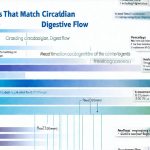Introduction
Our bodies are intricate biochemical machines, constantly working to break down food, absorb nutrients, and utilize energy. A central component of this process is enzymes – biological catalysts that accelerate these crucial reactions. However, enzyme activity isn’t constant; it fluctuates throughout the day based on various factors including circadian rhythms, hormonal signals, and even what we’ve eaten previously. Understanding how meal timing can influence enzyme activation offers a powerful avenue for optimizing digestion, nutrient absorption, and overall well-being. It’s not just what you eat, but when you eat that profoundly impacts your body’s ability to effectively process food and harness its benefits.
For many people, meal timing is dictated by convenience or habit – grabbing breakfast on the run, skipping lunch during a busy workday, or eating dinner late at night after a long day. These patterns often disrupt natural enzymatic processes. This disruption can lead to issues like bloating, indigestion, reduced nutrient absorption, and even metabolic imbalances over time. Optimizing meal timing isn’t about restrictive dieting; it’s about working with your body’s natural rhythms to enhance its inherent capabilities. It is about strategically aligning food intake with peak enzymatic activity for maximum efficiency.
The Circadian Rhythm & Digestive Enzymes
The human body operates on a roughly 24-hour cycle known as the circadian rhythm, influencing everything from sleep-wake patterns to hormone production and metabolic processes. This rhythm significantly impacts digestive enzyme secretion throughout the day. Enzyme production isn’t uniform; it peaks during times when our bodies are naturally primed for digestion – typically with the rising sun in the morning and again during daytime activities. Conversely, enzyme activity tends to decline as evening approaches, preparing the body for rest and repair.
This natural rhythm explains why many people struggle to digest heavy meals late at night. The enzymes needed to break down carbohydrates, proteins, and fats are less active after dark. Eating a large meal before bed forces the digestive system to work harder when it should be resting, potentially leading to poor sleep quality and impaired digestion. Further, chronic disruption of this circadian rhythm through inconsistent meal times can desynchronize enzymatic processes, contributing to metabolic issues and reduced nutrient absorption over time. – Paying attention to your body’s natural clock is paramount for effective enzyme activation.
Aligning meal timing with these circadian rhythms requires mindful planning. For most individuals, a larger breakfast containing protein and healthy fats can kickstart digestive enzyme production after an overnight fast. Lighter lunches and smaller, earlier dinners are generally easier to digest as the day progresses. This approach supports optimal enzymatic function throughout the day and minimizes stress on the digestive system during sleep. It’s important to note that individual circadian rhythms vary; observing your own body’s responses is key to determining the most effective meal timing strategy for you.
Intermittent Fasting & Enzyme Regulation
Intermittent fasting (IF) has gained popularity as a dietary approach, and its effects on enzyme regulation are noteworthy. IF involves cycling between periods of eating and voluntary fasting, which can significantly alter enzymatic activity and metabolic pathways. During the fasted state, the body switches from utilizing glucose as its primary fuel source to burning stored fat. This shift requires increased activation of enzymes involved in lipolysis (fat breakdown) and beta-oxidation (fat utilization).
- One key benefit of IF is that it gives the digestive system a break, allowing enzyme levels to reset and improve sensitivity. When we constantly bombard our bodies with food, enzymatic pathways can become overwhelmed or desensitized. Periodic fasting allows these pathways to recover and function more efficiently. This isn’t about deprivation; it’s about strategic periods of rest for your digestive system.
- Another aspect is the potential upregulation of autophagy during fasting periods – a cellular “housekeeping” process where damaged cells are removed, promoting overall health and potentially enhancing enzymatic efficiency.
However, IF isn’t a one-size-fits-all solution. The timing and duration of fasting periods should be tailored to individual needs and tolerance levels. It is also crucial to break the fast with easily digestible foods that won’t overwhelm the digestive system. A sudden influx of complex carbohydrates or large amounts of fat can negate some of the benefits of IF.
Food Combining & Enzymatic Demand
The concept of food combining suggests that certain food combinations are easier for the body to digest than others, impacting enzymatic demand and potentially improving nutrient absorption. While scientific evidence supporting strict food-combining rules is limited, there’s a rationale behind the idea. Different foods require different enzymes for breakdown; mixing foods requiring drastically different enzymatic environments can place a strain on the digestive system.
For example, combining large amounts of protein with carbohydrates (like steak and pasta) requires the body to switch between producing acidic enzymes for protein digestion and alkaline enzymes for carbohydrate digestion. This switching back and forth can be less efficient than digesting each food group separately. – A more streamlined approach is to focus on prioritizing whole foods and consuming them in a way that minimizes digestive stress.
– Consider separating high-protein meals from large carbohydrate servings, or pairing proteins with non-starchy vegetables which are generally easier to digest.
It’s important not to become overly restrictive with food combining; it’s more about being mindful of how different foods interact within your digestive system and adjusting accordingly. Paying attention to how you feel after eating certain combinations can provide valuable insight into your individual tolerance levels and enzymatic capabilities.
Pre- & Probiotics: Supporting Enzymatic Ecosystems
The gut microbiome—the trillions of bacteria residing in our intestines—plays a crucial role in digestion and enzyme production. Probiotics, the beneficial bacteria found in fermented foods or supplements, can enhance this microbial ecosystem, leading to improved enzymatic activity. Certain probiotic strains produce enzymes that aid in breaking down complex carbohydrates, proteins, and fats, supplementing the enzymes naturally produced by the body.
Prebiotics, on the other hand, are fibers that act as food for these beneficial bacteria, promoting their growth and proliferation. By incorporating both pre- and probiotic-rich foods into your diet, you can cultivate a thriving gut microbiome that supports optimal enzymatic function. Examples of prebiotic sources include garlic, onions, leeks, asparagus, and bananas. Fermented foods like yogurt, kefir, sauerkraut, and kimchi are excellent sources of probiotics.
- A healthy gut microbiome doesn’t just improve digestion; it also enhances nutrient absorption, strengthens the immune system, and even influences mental health. Investing in your gut health is an investment in overall well-being and enzymatic efficiency.
- Furthermore, chronic stress, antibiotic use, and poor dietary habits can disrupt the gut microbiome, impairing its ability to produce essential enzymes. Prioritizing a balanced diet rich in fiber, fermented foods, and minimizing stress are key steps in restoring and maintaining a healthy gut ecosystem.
Ultimately, optimizing meal timing is about understanding your body’s natural rhythms and working with them rather than against them. It’s not a rigid set of rules but an adaptive approach tailored to individual needs and lifestyles. By aligning food intake with peak enzymatic activity, supporting the gut microbiome, and being mindful of food combinations, you can unlock the full potential of your digestive system and experience significant improvements in health and well-being.


















